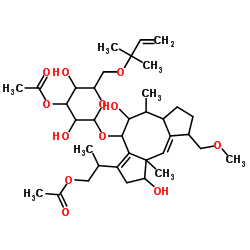Fusicoccin-A selectively induces apoptosis in tumor cells after interferon-alpha priming.
Ingrid J de Vries-van Leeuwen, Chantal Kortekaas-Thijssen, Jean A Nzigou Mandouckou, Sjors Kas, Antonio Evidente, Albertus H de Boer, Ingrid J. de Vries-van Leeuwen, Chantal Kortekaas-Thijssen, Jean A. Nzigou Mandouckou, Sjors Kas, Antonio Evidente, Albertus H. de Boer
文献索引:Cancer Lett. 293(2) , 198-206, (2010)
全文:HTML全文
摘要
Active small molecules have a high potential for the development into new anti-cancer drugs. Here we analysed the effect of the natural occurring fusicoccanes, Fusicoccin-A (FC), Ophiobolin-A (OPH-A) and Ophiobolin-I (OPH-I) on various tumor cell lines. Both FC and OPH-A inhibit tumor cell growth efficiently, in contrast to OPH-I. Further analysis showed that FC is tumor specific, and that its efficacy can be enhanced by combining it with the cytokine interferon-alpha (IFN-alpha). In this, IFN-alpha primes the tumor cells for apoptosis induction by FC, in which DR4 and the TRAIL pathway plays an important role. Healthy cells (HUVECs, Human Umbilical Vein Endothelial Cells) are far less sensitive to IFN-alpha/FC treatment and need the continuous presence of both compounds in order to achieve a growth reduction. This differential response between healthy and tumor cells indicates that the IFN-alpha/FC treatment is a promising new cancer treatment, especially when IFN-alpha and FC are used sequentially.Copyright 2010 Elsevier Ireland Ltd. All rights reserved.
相关化合物
| 结构式 | 名称/CAS号 | 分子式 | 全部文献 |
|---|---|---|---|
 |
壳梭孢(菌)素
CAS:20108-30-9 |
C36H56O12 |
|
Identification and characterisation of the phenolics of Ilex...
2014-10-01 [Plant Physiol. Biochem. 70 , 504-11, (2013)] |
|
Apoplastic alkalinization is instrumental for the inhibition...
2011-04-01 [Plant Physiol. 155(4) , 2049-55, (2011)] |
|
Characterization of the plasma membrane H+-ATPase in the liv...
2012-06-01 [Plant Physiol. 159(2) , 826-34, (2012)] |
|
Effects of fusicoccin on ion fluxes in guard cells.
2010-05-01 [New Phytol. 186(3) , 636-47, (2010)] |
|
Inhibition of dark-induced stomatal closure by fusicoccin in...
2010-11-01 [Physiol. Plant. 140(3) , 258-68, (2010)] |